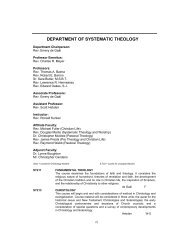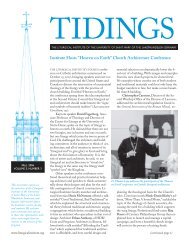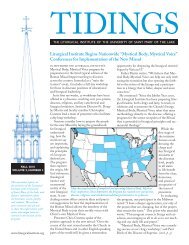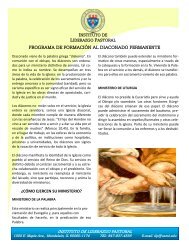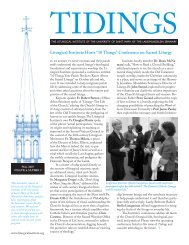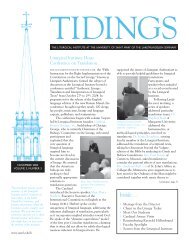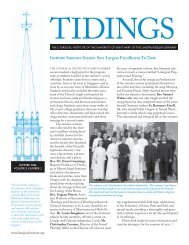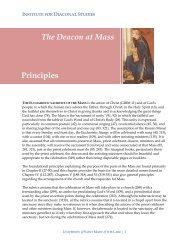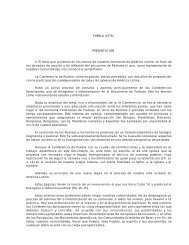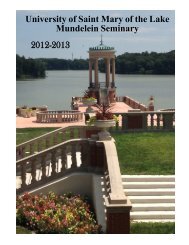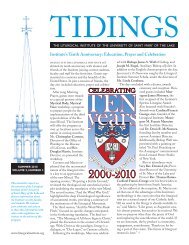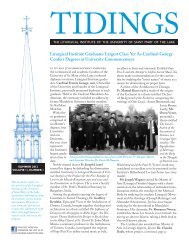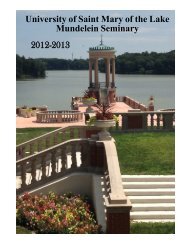National Directory for the Formation, Ministry and Life of Permanent ...
National Directory for the Formation, Ministry and Life of Permanent ...
National Directory for the Formation, Ministry and Life of Permanent ...
You also want an ePaper? Increase the reach of your titles
YUMPU automatically turns print PDFs into web optimized ePapers that Google loves.
76Chapter 4communities. Their support <strong>and</strong> encouragement will effectivelyassist in <strong>the</strong> recruitment <strong>of</strong> qualified nominees from <strong>the</strong>ir communities.Representatives <strong>of</strong> U.S. ethnic <strong>and</strong> cultural communities—suchas Americans <strong>of</strong> African, Pacific Asian, Native American, <strong>and</strong>Hispanic heritage—who participate as consultants to <strong>the</strong> diaconate<strong>of</strong>fice, can provide significant insight on cultural subtleties <strong>and</strong> <strong>the</strong>ireffect upon discernment <strong>and</strong> <strong>for</strong>mation programming, including pastoralplacement.Hispanic AmericansStudy <strong>of</strong> language<strong>and</strong> cultureMulticultural sensitivity162. Of particular importance in <strong>the</strong> United States is <strong>the</strong> largeHispanic Catholic population. Knowledge <strong>of</strong> Spanish <strong>and</strong> <strong>of</strong>Hispanic cultures is important in both recruiting <strong>and</strong> retainingHispanic c<strong>and</strong>idates. In each path in <strong>for</strong>mation, essential resources—e.g., translators, textbooks, mentors, community support—should beprovided to ensure <strong>the</strong> inclusion <strong>of</strong> each participant.163. Care ought to be taken, especially in <strong>the</strong> post-ordinationpath in <strong>for</strong>mation, to provide opportunities <strong>for</strong> English-speakingdeacons to learn Spanish, or o<strong>the</strong>r appropriate languages used in <strong>the</strong>diocese, on a conversational level. The opportunity <strong>for</strong> <strong>for</strong>mal study<strong>of</strong> Hispanic <strong>and</strong> o<strong>the</strong>r cultures also should be provided. Fur<strong>the</strong>r, <strong>the</strong>study <strong>of</strong> English <strong>and</strong> <strong>the</strong> historical development <strong>of</strong> a multiculturalsociety within <strong>the</strong> United States should be provided to those whoseprimary language is not English.164. The above discussion regarding <strong>the</strong> recruitment <strong>and</strong> retention<strong>of</strong> Hispanic c<strong>and</strong>idates applies to each cultural, racial, <strong>and</strong> ethniccommunity. Those responsible <strong>for</strong> recruitment, discernment, <strong>and</strong><strong>for</strong>mation have a responsibility to exercise multicultural sensitivity.They need to appreciate cultural subtleties <strong>and</strong> differences,acknowledging <strong>the</strong> historical constrictions experienced within <strong>the</strong>secommunities. Fur<strong>the</strong>r, familiarity with family structures <strong>and</strong> traditionsis important. This cultural/racial/ethnic orientation <strong>and</strong> sensitivityenables recruiters <strong>and</strong> those involved in <strong>for</strong>mation to competentlydiscern <strong>and</strong> foster diaconal vocations within <strong>the</strong>se diversefaith communities.



